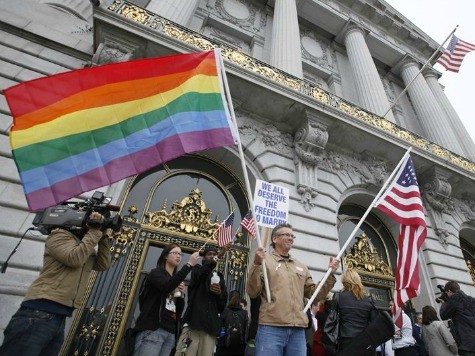Several major cases will be decided by the Supreme Court over the next six weeks, including historic issues such as gay marriage and affirmative action. These cases make the remainder of the Court’s term–which ends in June–one of the most carefully watched terms by millions of Americans.
In addition to several significant cases that have already been decided this year, the justices of the High Court have at least ten important issues to decide before adjourning for the summer.
Two headline cases involve race relations. In Fisher v. University of Texas the Court is considering whether racial preferences (affirmative action) violate the Equal Protection Clause of the Constitution’s Fourteenth Amendment. This case was argued on Oct. 10, 2012, in the first days of the Supreme Court’s term (which by law starts Oct. 1 each year), and it is unusual to have a case argued in early October still awaiting a decision in late May.
In the other–Shelby County v. Holder–the Court is considering whether disenfranchising voters on account of race has receded to the point that Section 5 of the Voting Rights Act, which allows the U.S. Department of Justice to supervise voting laws in some states (mostly in the South), is no longer authorized by the Fifteenth Amendment of the Constitution.
There is also a second election law case. In Arizona v. The Inter Tribal Council of Ariz., the Court will decide whether Congress’ power under the Constitution’s Elections Clause to regulate the time, place, and manner of federal elections trumps state laws in the same fashion as the Constitution’s Supremacy Clause enables federal laws to trump state laws, or instead if a different test determines which side prevails when federal and state authorities conflict.
Under the Fifth Amendment’s Takings Clause, the government cannot take your property unless such taking is for a public purpose and the government compensates you with the market value of your property. A second case out of Arizona involves property rights. In Horne v. Department of Agriculture, the Court is determining whether when the government sues you for money you can refuse to pay if you’re using the Takings Clause as a defense, or instead of you must pay the money, then later sue the government to argue the Takings Clause has been violated.
Another Fifth Amendment case involves a criminal procedure issue concerning the Self-Incrimination Clause. In Salinas v. Texas, the justices will decide under what circumstances the Fifth Amendment protects a defendant who refuses to answer police questions before either being arrested or read his Miranda rights.
A second criminal procedure case pertains to the Fourth Amendment, which governs searches and seizures. If a person has been arrested and charged with a serious crime, in Maryland v. King the High Court will determine whether the Fourth Amendment permits police to collect DNA samples from cotton swabbing of the mouth.
In an intriguing case that highlights the questions our society will face as technology progresses, another case involves patent law. In Association for Molecular Pathology v. Myriad Genetics, the justices will determine whether human genes can be patented.
One case involves free speech. In Agency for International Development v. Alliance for an Open Society, the Court will decide whether a federal law requiring an organization to have a policy opposing prostitution and trafficking in order to receive federal funds violates the First Amendment.
Finally, the biggest issue before the Supreme Court is gay marriage. In U.S. v. Windsor, the justices are considering whether the Defense of Marriage Act (DOMA) violates the Fifth Amendment. (It should also be noted that there might be a 50-50 chance the Court will dismiss this case on technical grounds, since it’s possible the federal courts lacked jurisdiction over the facts of this particular case.)
And the biggest case of this year is Hollingsworth v. Perry. In that case, the Court is deciding whether the Fourteenth Amendment includes a fundamental right to gay marriage. If so, then every state law that defines marriage as one man and one woman is unconstitutional. It should also be noted that if there is a constitutional right to gay marriage, there is almost certainly a constitutional right to polygamy as well.
So the next couple months at the Supreme Court are ones to remember, which could reshape significant parts of American society for future generations.
Breitbart News legal columnist Ken Klukowski is on faculty at Liberty University School of Law.

COMMENTS
Please let us know if you're having issues with commenting.